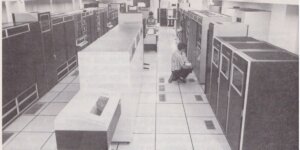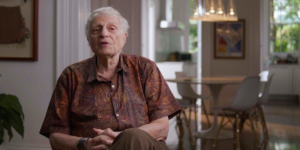Computer scientist Keith Uncapher, 80, whose pioneering research and development on computer networking helped lay the foundations for the Internet, died Oct. 10 in Los Angeles from a heart attack.
Also see: Keith Uncapher remembrance November 14, 2002, at USC University Park Campus
Uncapher founded the Information Sciences Institute (ISI) at the University of Southern California School of Engineering three decades ago and served as its executive director until 1987. Under his leadership ISI researchers developed such key elements of the Internet as the “dot.com” domain name system and made major contributions to electronic mail and basic Internet protocols.

Keith W. Uncapher April 1, 1922-October 10, 2002
“Keith was present at the creation,” said Uncapher’s successor as ISI executive director, Herbert Schorr. “When the smoke clears and historians are able in a hundred years to take a look back, they’ll see that he and his creations were at the center of the information technology revolution of the late twentieth century.”ISI began in 1972. Uncapher was director of the computer science division at RAND Corporation in Santa Monica. His work on the technology of packet switching, in which digital messages are broken into small packets, sent over a network and reassembled at their destination, had attracted great interest at the Department of Defense Advanced Projects Research Agency. He helped officials see the technology’s vast potential for facilitating a revolution in computer communications.
Uncapher persuaded both the government and the late dean of USC Engineering, Zohrab Kaprielian, to form a sophisticated university-based research agency and ISI opened the offices it still occupies in Marina del Rey, California.
“Vietnam was winding down,” Uncapher recalled in 1997. “ISI was designed to help rebuild the bridge between the Department of Defense and academia.”
While still at RAND, Uncapher designed the first time-sharing computer system for mathematicians. He led the packet- switching technology project and the RAND Tablet Project, a computer system for recognizing hand printed characters using a tablet and stylus. Packet switching research and development led first to the military’s Arpanet, and then to the Internet itself.
In addition to networking research, at ISI Uncapher started a cooperative to share the cost of prototyping new silicon chip designs that has been used by chipmakers for more than 50,000 prototypes.
Under Uncapher, ISI grew from a staff of three to 240. It now has a staff of more than 350.
“Keith Uncapher was a brilliant pioneer whose work advanced not only USC and its School of Engineering, but the whole field of computers,” said a fellow engineer, USC President Steven B. Sample.
“Very early on, Keith grasped the potential of packet switching technology,” said C. L. Max Nikias, current dean of the USC School of Engineering. “With his marvelous talents for engineering and administration, he has made the world both a smaller and better place for all of us.”
Uncapher was born in Denver, Colo., April 1, 1922. He attended Glendale College and completed his BS degree in electrical engineering at Cal State-Poly in San Luis Obispo. He also served four years in the U.S. Navy during World War II.
At the time of his death, Uncapher was senior vice president of the Corporation for National Research Initiatives in Reston, Va., an organization he co-founded in 1986 with fellow Internet pioneers Dr. Robert E. Kahn and Dr. Vinton Cerf. There he was pursuing several technology initiatives, notably one on micro electro mechanical systems. He was also Associate Dean for Information Sciences, Emeritus, at the USC School of Engineering.
His honors included a Distinguished Service Award from the American Federation of Information Processing Societies; the Department of the Air Force’s highest civilian award, the Decoration for Exceptional Civilian Service; and the Institute for Electrical and Electronic Engineers Computer Society Centennial Medal.
The citation upon his election in 1998 to the National Academy of Engineering, engineering’s most distinguished society, noted his contribution to “information technology on the national level.”
Uncapher chaired the Stanford University Computer Science Advisory Committee and the Carnegie-Mellon University Computer Science Advisory Board. He was a member of the United States Air Force Scientific Advisory Board; the National Research Council, Board of Telecommunications; the Defense Information Systems Agency’s Scientific Advisory Group; the Federal Judicial Center’s Scientific Advisory Group; the Carnegie-Mellon Visiting Committee on Science; the Institute for Defense Analyses Computer Science Advisory Group; and the EDUCOM Board of Trustees.
Uncapher was a resident of Playa del Rey. He is survived by his wife Doris and two sons, William B. Uncapher and Jeffrey K. Uncapher.
Published on October 11th, 2002
Last updated on August 10th, 2021
Share This Story













